

Opening 15 Nov 2007
Directed by:
Özer Kiziltan
Writing credits:
Onder Cakar
Principal actors:
Erkan Can, Güven Kiraç, Meray Ülgen, Öznur Kula, Erman Saban
In an old and traditional Istanbul neighborhood, the shy and retiring Muharrem (Erkan Can) lives modestly, his daily routine consisting of his undemanding job in a warehouse and his religious observances. Once a week he goes to Dergah, the nearby monastery of an Islamic sect, where he participates in the evening prayer ritual, a hypnotic mixture of chanting and swaying movement. His unremarkable and simple life is occasionally disturbed by dreams of an attractive woman who tempts him with sex and alcohol, leaving him with soiled sheets and a guilty conscience. Muharrem avoids confrontation with the outside world and modern trappings, preferring his circumscribed life.
His simplicity and godliness attract the attentions of the imam at Dergah, who assigns Muharrem the task of collecting rents for the numerous properties owned by the monastery. Plagued with doubt about his ability to take on such a task, he nonetheless sets out to do a good job, still guided by his strict moral and religious principles. He is outfitted with everything a good businessman needs – new suits, car and driver, cell phone, and leather briefcase. At first he is uncomfortable in his new role, and he soon comes face to face with the contemporary aspects of Istanbul and the materialist influences from the west. Although this collision of values confuses Muharrem greatly and causes him great mental anguish, he continues with his responsibilities and begins to succumb to the temptation of corruption.
Instead of enjoying his newfound wealth and respect, Muharrem is unable to reconcile his new persona with his innate devotion and religious observance. His dreams of temptation become more frequent until they finally mesh with his reality, driving him to utter despair.
Can gives a riveting performance of a man in torment, portraying his transformation from humble clerk to respected businessman with subtle, almost imperceptible changes in his body language, demeanor and conversational skills, which accumulate over the course of the film. Muharrem's downward spiral is also conveyed with physical accuracy, as Can conveys a figure who demands the viewer's sympathy and pity. At the end we are left to wonder if he has been played as a pawn or perhaps failed miserably at a once-in-a-lifetime opportunity.
Although the film depicts Islam as a conservative religion unable to hold a place in contemporary society, it is really a parable for any religion or set of beliefs which stays rooted in the past and refuses to change. Contemporary problems cannot be solved by a set of rules and laws set up centuries ago, and the film intimates that both ideologies and people need to adapt in order to survive. It raises questions about religious vs. secular values and how we reconcile them, pressing issues not only in our own lives, but also in today’s global/political arena. In Turkish with German subtitles. (Erica Fox Zabusky)